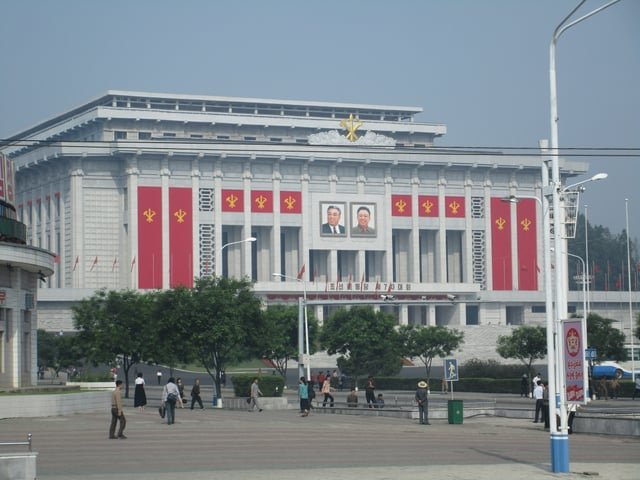
7th Congress of the Workers’ Party of Korea
| 7th Congress of the Workers’ Party of Korea | |
|---|---|
| Date(s) | 6 May 2016–9 May 2016 |
| Location(s) | April 25 House of Culture, Pyongyang, North Korea |
| Previous event | 6th Congress of the Workers’ Party of Korea (1980) |
| Participants | 3,467 delegates |
The7th Congress of the Workers’ Party of Korea(WPK), the ruling party ofNorth Korea, was held on 6–9 May 2016.
| 7th Congress of the Workers’ Party of Korea | |
|---|---|
| Date(s) | 6 May 2016–9 May 2016 |
| Location(s) | April 25 House of Culture, Pyongyang, North Korea |
| Previous event | 6th Congress of the Workers’ Party of Korea (1980) |
| Participants | 3,467 delegates |
Background
The 7th Congress was the first Congress of the Workers’ Party of Korea held since the 6th Congress in 1980, despite party rules stipulating that Congresses be held every four years.[1]
On 30 October 2015, the Korean Central News Agency (KCNA) reported that the Political Bureau of the Central Committee of the Workers’ Party of Korea announced a decision to hold a Congress in early May 2016, saying:
The Political Bureau of the WPK Central Committee decides to convene the 7th Congress of the WPK early in May Juche 105 (2016), reflecting the demand of the party and the developing revolution that witness epoch-making changes in accomplishing the revolutionary cause of Juche, the cause of building a thriving socialist nation.[4]
Preparations
On 17 February 2016 joint slogans were issued by Workers’ Party of Korea’sCentral Military Commissionand Central Committee, and they were published byRodong Sinmunand KCNA.[5]
The Congress was preceded by a “70-day battle” mass mobilization campaign. Human Right Watch claims that the campaign meant uncompensated and forced labor for people across the country, including children, and that the object of the campaign was to boost outputs in manufacture and agriculture and demonstrate loyalty.[6]A five-day holiday was declared for the duration of the Congress.[7]
Congress

April 25 House of Culture decorated for the Congress
The Congress was opened on 6 May 2016 at the April 25 House of Culture inPyongyang,[8]in the presence of 3,467 voting delegates.[9]Unlike the last congress, there were no major foreign delegations,[10]but 128 foreign journalists from 12 countries were allowed to cover the event. Reporters were kept outside of the venue, and a recording of the opening event was only televised later in the evening.[11]
The Congress opened with an address byKim Jong-un. In it, he praised the country’s January 2016 nuclear and satellite launch.[8]After having chosen its presidium and secretariat, the Congress approved its agenda:[12]
-
Review of the work of the 6th WPK Central Committee
-
Review of the work of the WPK Central Auditing Commission
-
Revision of the WPK Charter
-
Election of Kim Jong-un to the leadership of the WPK
-
Election of members to the central leadership organs of the WPK
The Congress continued on 7 May with Kim Jong-un’s report on the work of the 6th Central Committee. In the report,[13]Kim Jong-un reiterated the country’s nuclear policy, calling it “a responsible nuclear weapons state”. According to Kim, North Korea would not use nuclear weapons unless its sovereignty was violated. With regards to the economy, Kim announced the country’s first Five-Year Plan since the 1980s.[14]Speeches by other delegates expressed support for Kim’s report.[15]
On the 9th, foreign journalists were briefly let in the Congress venue for the first time, during the announcement of Kim Jong-un’s election asChairman of the Workers’ Party of Korea.[18]The Congress ended on the 9th, and the day also saw a huge parade in Pyongyang in its honor.[19]
Officials elected by the Congress
On May 9, Kim Jong-un was re-elected to the leadership of the party. His title in this capacity was changed from First Secretary toChairman of the Workers’ Party of Korea,[18]a title reminiscent of that held by Kim Il-sung until 1966: Chairman of the WPK Central Committee.[20]
15 members were elected to the 7th Central Auditing Commission:[21]Choe Sung-ho, Pak Myong-sun, Kim Kyong-nam, Hwang Chol-sik, Kim Yong-chol, Ri Yong-ik, Kim Myong-hun, Kye Yong-sam, Jo Jong-ho, Kye Myong-chol, Jang Jong-ju, Pho Hui-song, Jong Pong-sok, Choe Kwon-su and Ho Kwang-uk.[22]The Commission soon convened and chose as its Chairman Choe Sung-ho and Vice-Chairwoman Pak Myong-sun.[23]
7th Central Committee
129 members and 106 alternate members were elected to the7th Central Committee, including Kim Jong-un.[21]It held its first plenum immediately after the Congress, on 10 May, and elected officials.[24]